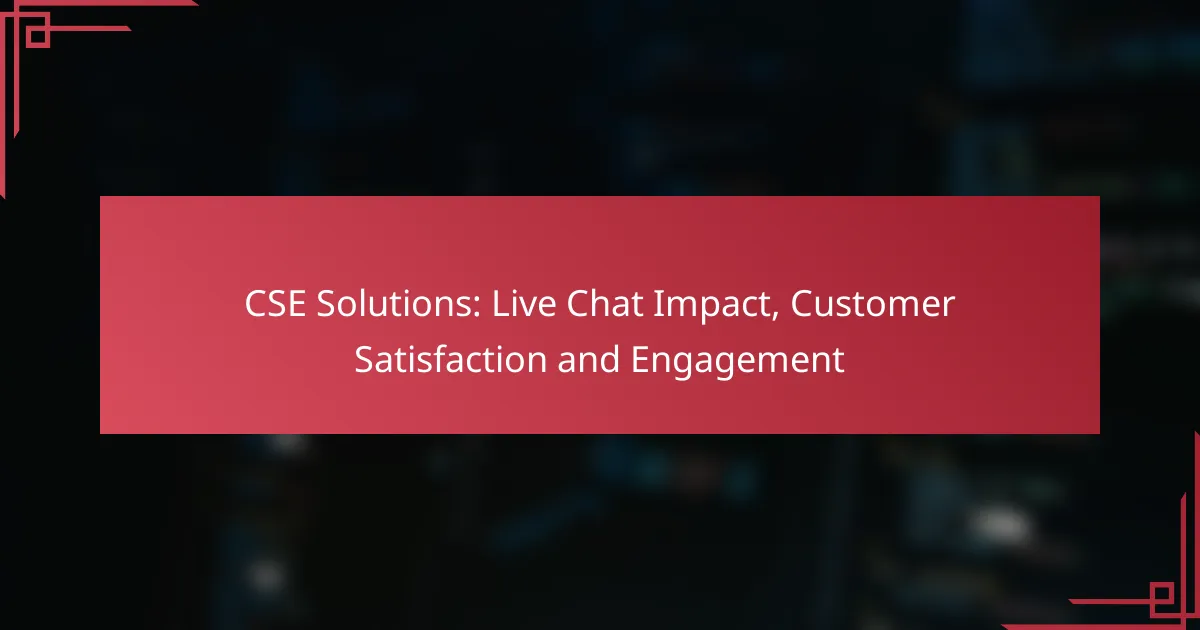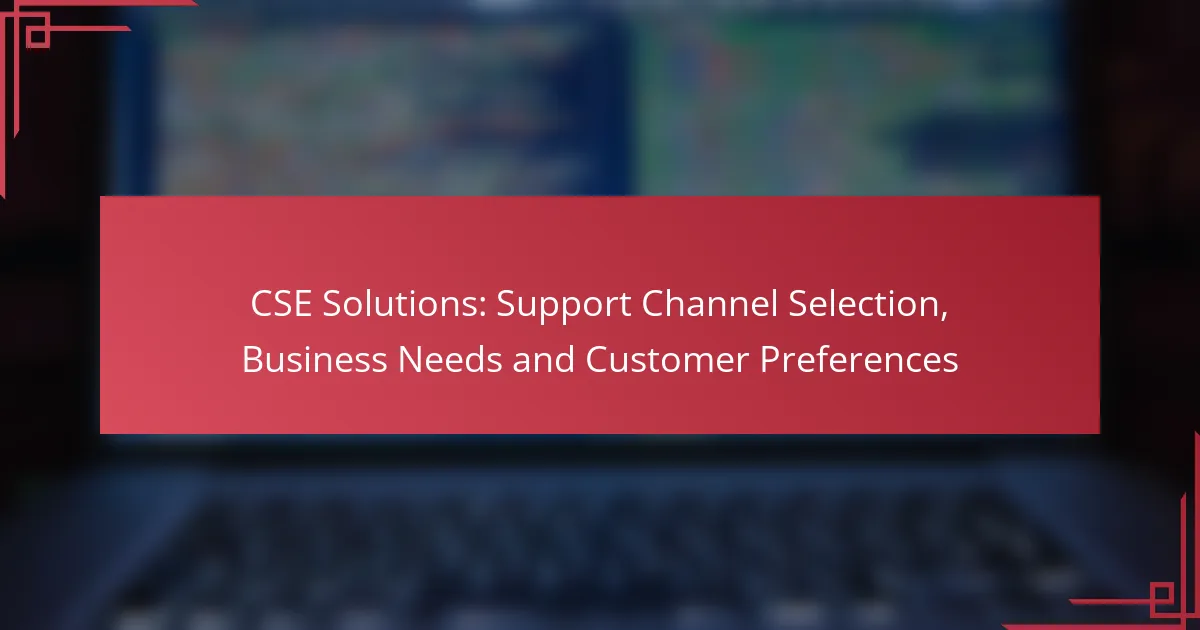Effective CSE solutions for team training focus on enhancing customer support skills through engaging methods, equipping teams to deliver exceptional multi-channel support. By fostering seamless engagement across various platforms, businesses can ensure consistent and personalized service for customers. Implementing best practices such as regular feedback loops and a continuous learning culture further enhances training effectiveness, adapting to the evolving needs of both teams and customers.

What are effective CSE solutions for team training in the UK?
Effective CSE solutions for team training in the UK focus on enhancing customer support skills through practical and engaging methods. These solutions aim to equip teams with the necessary tools and techniques to provide exceptional multi-channel support.
Interactive workshops
Interactive workshops are hands-on training sessions that encourage participation and collaboration among team members. These workshops can cover various topics, such as communication skills, problem-solving techniques, and customer engagement strategies.
To maximize effectiveness, workshops should be tailored to the specific needs of the team and incorporate real-life scenarios. Facilitators can use group activities and discussions to foster a deeper understanding of customer service principles.
Online training modules
Online training modules offer flexible learning opportunities for teams, allowing them to access content at their convenience. These modules can include video tutorials, quizzes, and interactive exercises that cover essential customer service skills.
When implementing online training, it’s beneficial to track progress and completion rates. This can help identify areas where additional support may be needed and ensure that all team members are up to date with the latest practices.
Role-playing scenarios
Role-playing scenarios simulate real customer interactions, enabling team members to practice their skills in a controlled environment. This method helps build confidence and improves communication techniques by allowing participants to experience various customer personalities and situations.
To enhance learning, it’s important to debrief after each role-play session, discussing what went well and what could be improved. This reflection helps solidify the lessons learned and encourages continuous improvement.
On-the-job coaching
On-the-job coaching involves experienced team members guiding less experienced colleagues during actual customer interactions. This approach provides immediate feedback and practical insights that can significantly enhance skill development.
Coaching should be structured, with specific goals and regular check-ins to assess progress. This method not only improves individual performance but also fosters a culture of support and collaboration within the team.
Certification programs
Certification programs validate the skills and knowledge of customer service professionals, providing them with recognized credentials. These programs often cover industry standards and best practices, ensuring that team members are equipped to meet customer expectations.
When considering certification, look for programs that are well-regarded in the UK market and align with your organization’s goals. Investing in certification can enhance team morale and demonstrate a commitment to professional development.

How can multi-channel support skills improve customer experience?
Multi-channel support skills enhance customer experience by allowing businesses to engage with customers across various platforms seamlessly. This approach ensures that customers receive consistent, timely, and personalized service, regardless of the channel they choose to use.
Seamless integration across platforms
Seamless integration across platforms enables support teams to manage customer interactions efficiently. By utilizing a unified system, agents can access customer information and conversation history regardless of whether the customer contacts them via email, chat, or social media.
This integration reduces response times and minimizes the risk of customers having to repeat themselves, which significantly improves satisfaction. For instance, if a customer initiates a chat and later calls, the agent can quickly reference previous interactions, leading to a smoother experience.
Personalized customer interactions
Personalized customer interactions are crucial for building rapport and trust. By leveraging data from various channels, support teams can tailor their responses based on customer preferences and past behavior.
For example, if a customer frequently purchases a specific product, agents can proactively offer related recommendations or support. This level of personalization not only enhances the customer experience but also drives loyalty and repeat business.
Real-time issue resolution
Real-time issue resolution is essential for maintaining customer satisfaction. Multi-channel support allows agents to address concerns immediately, whether through live chat or social media platforms.
Quick responses can prevent minor issues from escalating into major problems. For instance, if a customer encounters a technical issue, being able to resolve it in real-time can significantly enhance their perception of the brand.
Data-driven insights
Data-driven insights from multi-channel support can inform business strategies and improve service delivery. By analyzing customer interactions across different platforms, companies can identify trends, common issues, and areas for improvement.
For example, if data shows that most inquiries come from a specific channel, businesses can allocate resources accordingly or enhance that channel’s capabilities. This proactive approach not only improves efficiency but also aligns services with customer needs.

What best practices enhance CSE training effectiveness?
Best practices that enhance Customer Service Executive (CSE) training effectiveness include implementing regular feedback loops, fostering a continuous learning culture, and establishing clear performance metrics. These strategies ensure that training is not only comprehensive but also adaptable to the evolving needs of both the team and customers.
Regular feedback loops
Regular feedback loops are essential for improving CSE training. They provide opportunities for trainers and participants to exchange insights on performance and areas for improvement. This can be achieved through weekly check-ins, performance reviews, or even anonymous surveys.
To implement effective feedback loops, consider scheduling brief one-on-one sessions after training modules. Encourage open dialogue where CSEs can share their experiences and challenges. This practice helps identify knowledge gaps and reinforces learning.
Continuous learning culture
A continuous learning culture promotes ongoing development beyond initial training sessions. Encourage CSEs to participate in workshops, online courses, and peer learning groups. This approach not only enhances skills but also keeps the team engaged and motivated.
To foster this culture, provide access to resources such as e-learning platforms or industry webinars. Recognize and reward employees who actively seek out learning opportunities, as this can inspire others to follow suit.
Clear performance metrics
Establishing clear performance metrics is crucial for measuring the effectiveness of CSE training. Metrics such as customer satisfaction scores, response times, and resolution rates provide tangible benchmarks for success. These indicators help identify which areas of training are working and which need adjustment.
When setting performance metrics, ensure they are specific, measurable, achievable, relevant, and time-bound (SMART). Regularly review these metrics to track progress and make necessary changes to training programs, ensuring they remain aligned with business goals and customer expectations.

What prerequisites are needed for effective CSE training?
Effective Customer Service Excellence (CSE) training requires a solid foundation of skills and clear objectives. Prerequisites include assessing current capabilities and defining specific training goals to ensure the program meets the needs of both the team and the organization.
Baseline skill assessments
Baseline skill assessments help identify the existing competencies of team members before training begins. This can involve evaluating communication skills, problem-solving abilities, and product knowledge through tests or practical scenarios.
Consider using a mix of self-assessments and manager evaluations to get a comprehensive view. Aim for a clear understanding of each individual’s strengths and weaknesses to tailor the training effectively.
Defined training objectives
Defined training objectives provide a roadmap for what the CSE training aims to achieve. Objectives should be specific, measurable, attainable, relevant, and time-bound (SMART) to ensure clarity and focus throughout the training process.
For example, an objective might be to improve response times to customer inquiries by 20% within three months. Regularly revisiting these objectives during training can help keep the team aligned and motivated.

How to choose the right CSE training provider in the UK?
Selecting the right Customer Service Excellence (CSE) training provider in the UK involves assessing their reputation, the customization of their training programs, and the support and resources they offer. A well-chosen provider can significantly enhance your team’s skills and improve customer interactions.
Reputation and reviews
When evaluating a CSE training provider, check their reputation through online reviews and testimonials from previous clients. Look for providers with a strong track record in delivering effective training programs that have positively impacted customer service outcomes.
Consider seeking recommendations from industry peers or professional networks. A provider with a solid reputation is more likely to offer high-quality training that meets your specific needs.
Customization of training programs
Effective CSE training should be tailored to your organization’s unique requirements. Look for providers that offer customizable training modules, allowing you to focus on specific areas such as communication skills, conflict resolution, or multi-channel support.
Ask potential providers about their approach to customization. A good provider will work with you to identify your team’s strengths and weaknesses and develop a program that addresses those areas effectively.
Support and resources offered
Post-training support is crucial for reinforcing skills learned during CSE training. Choose a provider that offers ongoing resources, such as access to online materials, follow-up sessions, or coaching to ensure that your team continues to develop their skills.
Evaluate the types of resources available, such as training manuals, e-learning modules, or access to a community of practice. These additional supports can enhance the learning experience and help your team apply their new skills in real-world situations.

What are the emerging trends in CSE training?
Emerging trends in Customer Service Excellence (CSE) training focus on enhancing multi-channel support skills and adapting to evolving customer expectations. These trends emphasize the importance of continuous learning and the integration of technology to improve service delivery.
Multi-Channel Support Skills
Multi-channel support skills are essential for modern customer service teams, as customers now expect seamless interactions across various platforms such as phone, email, chat, and social media. Training should include practical exercises that simulate real-world scenarios across these channels to ensure representatives can effectively engage with customers regardless of the medium.
Consider implementing role-playing sessions where team members practice handling inquiries through different channels. This approach helps build adaptability and confidence. Additionally, providing resources that outline best practices for each channel can guide representatives in delivering consistent service.
Best Practices for CSE Training
Best practices for CSE training involve a structured approach that includes regular assessments, feedback loops, and updated training materials. Establishing clear objectives for training sessions can help teams focus on key skills and knowledge areas that enhance customer interactions.
Incorporate technology, such as learning management systems, to provide ongoing training and track progress. Encourage a culture of feedback where team members can share insights and improvements. This continuous learning environment fosters growth and keeps the team aligned with current trends and customer expectations.



